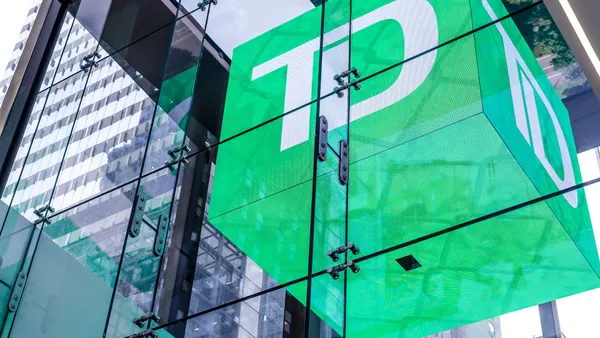Dive Brief:
-
The Consumer Financial Protection Bureau (CFPB) announced a proposed settlement Wednesday with Think Finance and six of its subsidiaries. The payday lender will have to reimburse consumers $39 million and pay the CFPB $7, one for each of the company's enitities.
-
The bureau’s lawsuit, filed in November 2017, alleges the payday lender "engaged in unfair, deceptive, and abusive acts and practices in violation of the Consumer Financial Protection Act in connection with the illegal collection of loans that were void in whole or in part under state laws governing interest rate caps, the licensing of lenders, or both." The settlement would also prohibit Think Finance entities from offering or collecting on loans to consumers in any of the 17 states that cap interest rates.
-
The enforcement action comes amid a flurry of activity for the CFPB, which sued Citizens Bank last week, alleging violations of the Truth in Lending Act for failing to properly manage credit card disputes.
Dive Insight:
Think Finance, which exited Chapter 11 bankruptcy in December, operated an online loan origination and servicing platform and partnered with tribal lenders to offer installment loans online.
The proposed settlement comes roughly a month before the Supreme Court is scheduled to hear oral arguments March 3 over whether the agency’s single-director structure is constitutional.
At issue is a provision in the Dodd-Frank Act that allows the president to only fire the director of the bureau "for cause."
While some of the agency’s opponents have called on Congress to structure it as a multi-member commission, the Supreme Court could also potentially rule the agency unconstitutional, resulting in its dissolution.
The agency, which was created in 2010 in response to the 2007-08 financial crisis, announced 22 cases during fiscal 2019, which ended Sept. 30, according to The Wall Street Journal, nearly double the 12 cases the bureau announced the previous year, but a little more than half the number of cases it handled in each year from 2015 to 2017. The CFPB has announced eight additional enforcement actions since Sept. 30.
Consumers harmed in last fiscal year's 22 cases got back $777 million, a four-year high, according to the Journal.













